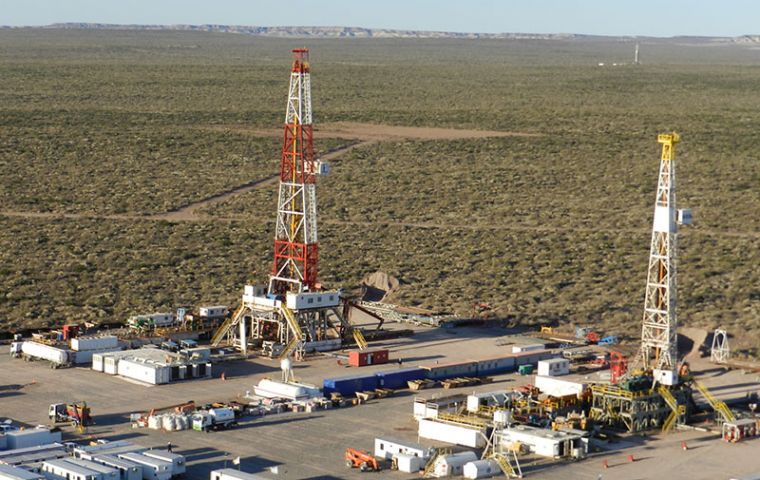MercoPress. South Atlantic News Agency
Argentina negotiates oil worker contracts in effort to woo investment
 Vaca Muerta in southern Argentina, one of the world's largest shale reserves, is still largely unexplored.
Vaca Muerta in southern Argentina, one of the world's largest shale reserves, is still largely unexplored. Argentina's government is negotiating more flexible oil workers' contracts to woo investors to the Vaca Muerta shale fields and overcome an energy deficit.High labour costs are thought to be the primary obstacle to investment in the country's oil and gas sector, and negotiations are politically sensitive in a country with an influential labour movement, meaning some changes are off the table.
“Negotiations are advanced, I'd say 80 percent, but the union will not budge on job security for workers,” Guillermo Pereyra, General Secretary of the private oil and gas union in Rio Negro, Neuquen and La Pampa, and Senator for the province of Neuquen, said in an interview.
Argentine Production Minister Francisco Cabrera told reporters in Washington last week that state-controlled energy company YPF (YPFD.BA) and unions were holding labour talks “because it is impossible to be productive.”
An agreement would allow companies to stop paying workers for commuting time, or so-called taxi hours, and would allow some workers to be hired only for short-term projects.
Vaca Muerta in southern Argentina, one of the world's largest shale reserves at some 30,000 square kilometres, has attracted investment from Chevron (CVX.N) and Exxon (XOM.N), but remains largely unexplored.
Argentina's unions became more demanding in the days of $100-per-barrel oil, and have been resistant to change, making companies like BP (BP.L) say they need to see more flexibility in labour laws before committing investments.
It is not clear if the labour agreement will be enough to interest new companies.
“We got to the point where we had so many strikes and conflicts that we could not even work,” the director of one company operating in Patagonia said on condition of anonymity.
New technology should allow drilling with a team of 16 workers, but the unions require companies to continue to employ 25 workers, the director said as an example.
On top of drilling costs, companies have to make a 10 percent contribution for “social peace,” a subsidy for out-of-work oil workers. Some companies report up to 60 percent of their employees are frequently absent.
Daniel Gonzalez, financial director of YPF, said recently the company's production was affected by two strikes this year.
“We continue projecting stable output for the year, but it could be negatively affected by more labour conflicts,” he said.




Top Comments
Disclaimer & comment rules-

-

-

Read all commentsIf the economy of scale went with sufficient probability of significant returns then there might be more willing to deal with the enormous risks and the galaxy of other powerful impediments involved in setting up and running a business in Argentina . But as we have all seen, considering the size - the scale - of the economy, both new foreign and new private domestic investment is practically nil. Such is the impact of the set of negative factors, which includes the long history of Argentina being wholly unreliable and untrustworthy, factors which the new World Bank analysis graciously didn't include but which certainly impact the present dearth of new investment (real investment, not cheap talk about it).
Nov 02nd, 2016 - 02:42 pm +2Number one on that list for relative ease for opening and running a business is New Zealand, which perhaps not coincidentally has been receiving increases in direct foreign investment at a rate of about 8 percent a year. Which of course Argentina could not even dream of and would in any event find a way to effectively discourage.
Perhaps the kiwis could teach the argies a few things, and then in 100 years or so....... nah, not going to happen.
----------
“....So Canada needs to work harder to attract investment.”
So Canada ranks 22nd in ease of setting up and running a business, and an unsurprisingly high level of direct foreign investment. A country also serving as a common enough destination for Argentines who can't cut it at home.
---
“....which means to [sic] many non-argentines in the world, to [sic] many foreigners... to [sic] many potential enemies....”
And too [sic] much argentine xenophobia.
The primary bar to development is the lack of confidence in the continuance of the rule of law.
Nov 02nd, 2016 - 02:22 pm +1It's said that a language is a dialect with an army.
Nov 02nd, 2016 - 03:19 pm +1In Argentina, bureaucracy is corruption with a legislature.
Commenting for this story is now closed.
If you have a Facebook account, become a fan and comment on our Facebook Page!